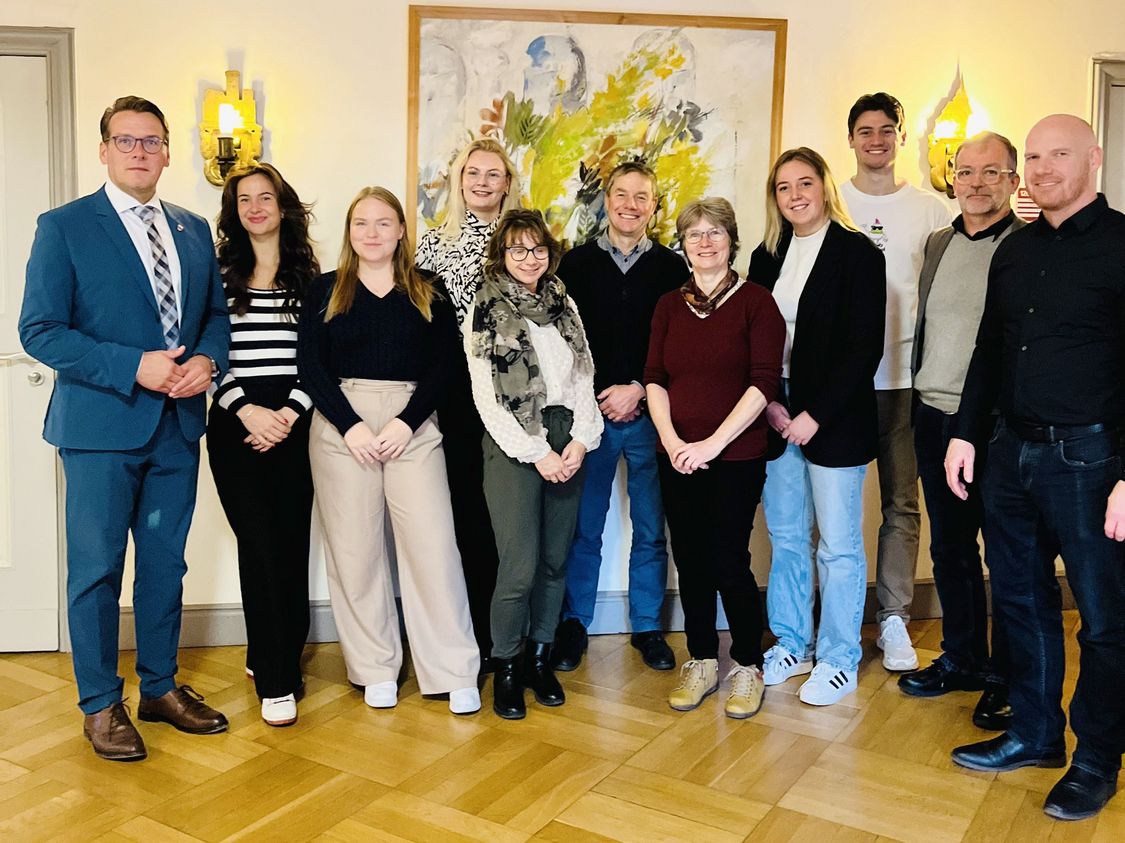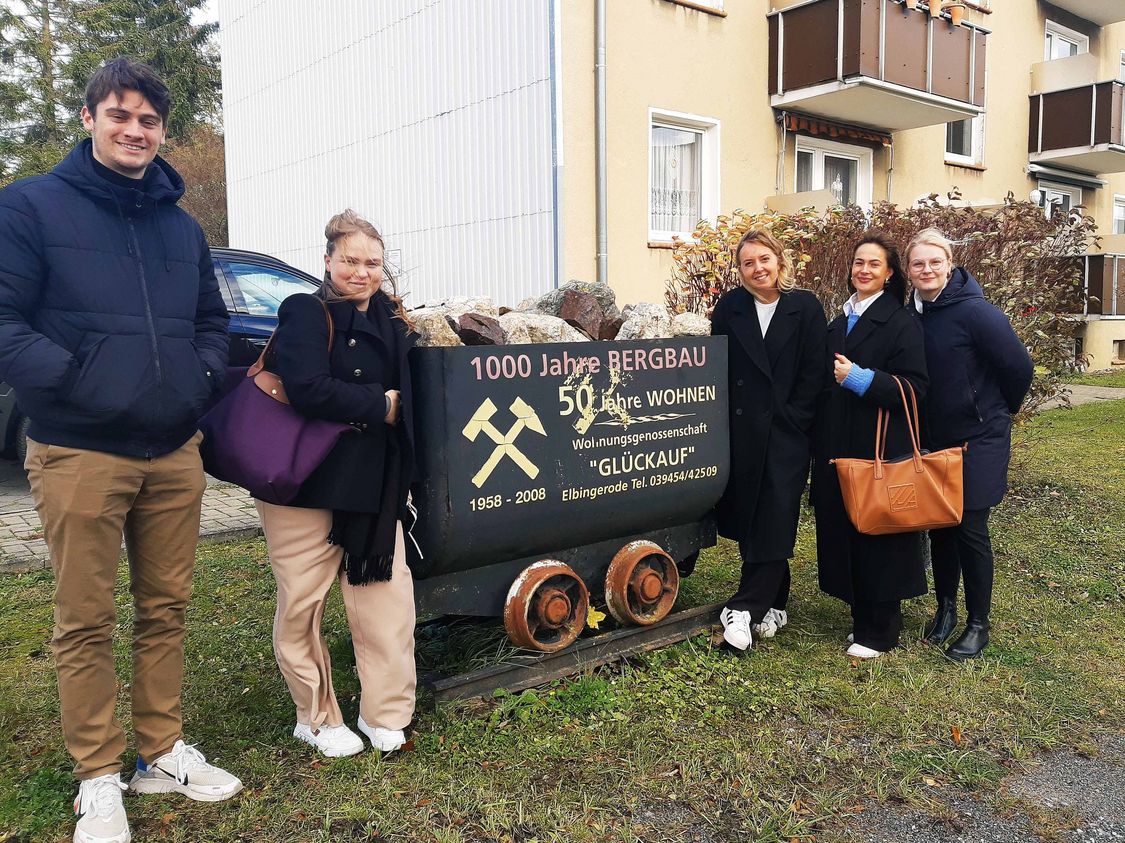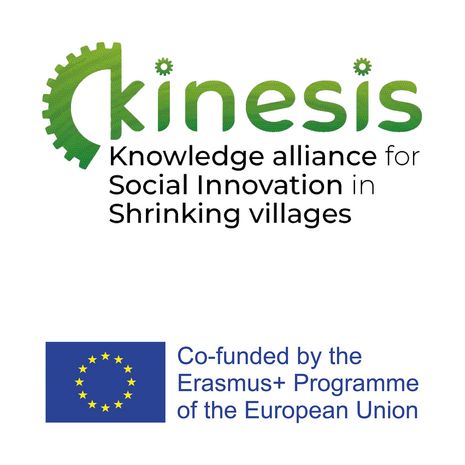
KiNESIS Project offers opportunities for young people while strengthening structurally disadvantaged regions
Bratwurst, lederhosen, football and schlager – six students from the Netherlands and one from Italy made their way to Wernigerode for a special exchange programme with all sorts of stereotypes in their heads. They not only wanted to get to know the Germany beyond the cliches, but also to share their knowledge and play an active role in city and regional life. This is the win-win scenario that drives the international association project KiNESIS.
In addition to Germany – represented by Harz University of Applied Sciences – twelve other partner institutions from Italy, Spain, the Netherlands and Estonia are involved in the project, among them four other universities. “All partner universities are located in rural regions that are facing enormous challenges right now, not least due to demographic and structural change and ecological problems. Usually, the people on site aren’t able to find solutions to these issues for various reasons,” says project lead Dr Andrea Heilmann. “On the other hand, because we are universities, we have students with new ideas and who want to gain international experience. With the KiNESIS Project, we’re bringing these young people together with figures from these shrinking areas so that they can learn from each other through concrete projects and issues.”
Every university involved in the project offers months-long internships in their regions that have been developed in advance with local partners. This allows clarification of the needs and potential support requirements, explains Andrea Heilmann. It’s also possible to get involved with a lecture, in which case the stay only lasts a few weeks. “With side jobs and personal obligations, it’s not possible for every student to spend two to six months in another country. We offer both possibilities so that as many interested persons can get involved as possible,” says Heilmann.
Six young people from Groningen, Netherlands decided to stay for two weeks. They are in their fifth semester studying Property Management at Hanze University of Applied Sciences. “For our programme, we have to write a thesis. One option was to develop a concept for co-working spaces in historical buildings. We really liked that idea, because we not only get to broaden our knowledge, but also to travel to Germany and find out how they deal with that issue here,” explains Hilde Inberg (21). “It’s always nice to get to know a new city. Co-working spaces are a new, forward-facing manner of working,” adds Selma Karakaya. Together, they hope to put together a promising concept.
Back home in the Netherlands, they have already spoken with operators and users of co-working spaces. They took this experience to Wernigerode and the surrounding region so that they could speak with people about their wants and requirements for a modern office concept. In addition to interviews with students and employees from Harz University of Applied Sciences, the agenda included a visit to Mayor of Wernigerode Tobias Kascha, subsequent tour of the city, and a meeting with Ronald Fiebelkorn, Mayor of Oberharz am Brocken. “This city, built on mining and consisting of 13 districts, is exemplary of the shrinking regions that KiNESIS seeks to focus on”, says project coordinator Dr Ute Urban, who is supervising the students during their stay. “When we visited I was especially pleased that the mayor had invited a Dutch restaurateur and hotel manager who lives in the Trautenstein district of the city. This allowed the students to ask a compatriot about his experiences and share ideas with each other.”


While the Dutch group spends two weeks in Germany, Marika Lamberti decided to spend two months in the Harz. The 24-year-old from Italy is studying Intercultural Communication in Mediterranean Europe at Università di Napoli L'Orientale and is working on a marketing project about the Via Romea Germanica. Her task: Use social media campaigns, translate the website and existing marketing brochures into Italian, and develop appealing event formats to raise awareness of the pilgrimage route that leads from Stade in northern Germany through the Harz and across Austria all the way to Rome. She speaks with people on site and uses the information she gains to create new marketing approaches.
“The Via Romea isn’t as well known among pilgrims as the Way of St. James that leads to Santiago de Compostela, unfortunately,” says Marika Lamberti. At 2200 kilometres, the route is nearly three times as long as the Camino Francés, the most popular route along the Way of St. James. The European Council named the Via Romea a European Cultural Route in 2020. “This certification is valid for three years. I’d like for my ideas and concepts to help renew that certification.”
Marika has already been won over by the beauty of the Harz region. “I’m really happy to be here. Wernigerode is so picturesque, it looks like a film set,” she swoons. Unlike Naples, where the streets are packed with people day and night, Lamberti says that Wernigerode is very quiet and a perfect place to relax. “I would miss all the life of Naples after a while. And the sunny weather,” she says, glancing at her weather app, which shows 18 degrees in autumn.
The aspiring property managers from the Netherlands have found some other differences. “Building prices are exponentially cheaper here than they are back home. There’s barely anything under 300,000 euros,” says Hilde. The group was also excited about the affordable campus dining, the city, and the campus in Wernigerode as a whole. “With the steam engine, the beautiful Fachwerk houses, the trees and the lake on campus, it’s kind of like a fairy tale here,” says Selma (23). “You can’t help but feel welcome here.“

In addition to the experiences that students can get through the exchange programme, project director Andrea Heilmann also sees added value for her own work and for the entire university. “For me, it’s very interesting getting to know the other universities and how they teach. Every institution has a different approach to the interregional transfer of knowledge and working with companies. It’s not just exciting, but also informative,” she says. “I see added value for the university in the innovative approach to facilitating international exchanges outside of a full semester abroad. Because we’re able to integrate these into lectures, the programme is very flexible and accessible.” She wants to encourage local students to take this unique opportunity before the project’s upcoming end.
APPLY FOR AN EXCHANGE ABROAD NOW
The KiNESIS team at Harz University of Applied Sciences is still looking for students who are interested in participating in the programme. Students can spend several weeks or months in Italy, Spain, the Netherlands or Estonia.
You can find an overview of available topics at: Available internships
Before applying, please contact project coordinator Ute Urban to clear up questions and arrange the next steps.
17.11.2023
Author: Karoline Klimek
Image author: © Karoline Klimek, Stadt Wernigerode, Ute Urban
Image rights: © Hochschule Harz


